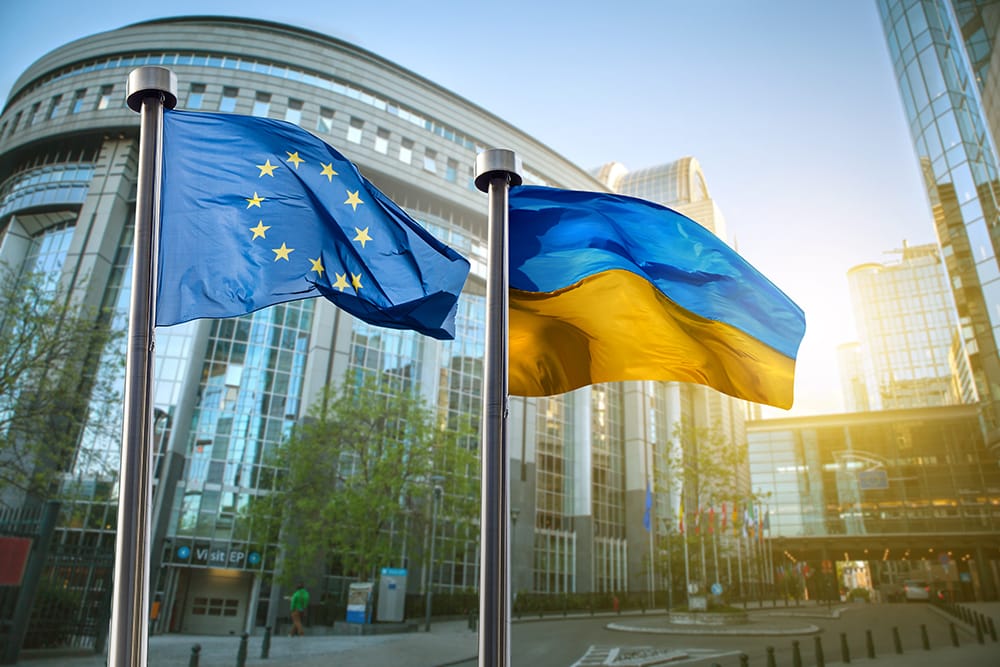Ukraine should move rapidly to advance accession negotiations now underway with the European Union (EU), according to experts who spoke at the recent DAI-sponsored webinar, “Catalyzing Business Growth in Ukraine through Accelerated EU Accession.”
The webinar—attended by more than 100 stakeholders—focused on factors critical to expediting accession, including the alignment of Ukraine’s governance with EU standards and strengthening Ukraine’s green economy to ensure greater competitiveness.
Speakers included Hugues Mingarelli, an expert on EU accession and former EU Ambassador to Ukraine (2016–2019); Oliver Mader, DAI’s European Governance Practice Leader and a former manager at EU institutions; Olga Boiko, Industrial Ecology and Sustainable Development Committee Coordinator at the European Business Association; and Rade Glomazić, DAI’s Director of Implementation in Türkiye.
Top Recommendations
Speakers agreed that Ukraine should not wait for the invasion to end before beginning reconstruction. The Ukraine Facility Plan, now approved by the European Commission, has allocated €50 billion for 69 key reforms and 10 investments, measured by 156 indicators. Demonstrated achievement of these indicators will trigger disbursement of funds from the Facility to Ukraine’s state budget until 2027.
The Ukraine Facility Plan is now the key document to be used by European Commission and others to improve of the business environment, investment climate, and small- and medium-sized enterprise (SME) development, combined with the (almost approved) SME Strategy.
Other priorities identified include the following:
- Ensure coordination between key ministries and the relevant Ukrainian Parliamentary committees to approve any Ukrainian legislation created or amended to align with European norms.
- Involve local government and other stakeholders in the recovery and EU accession process to make sure any decisions made are agreed and implementable at the local level.
- Recognize that businesses are key both to reconstruction and accession and engage them accordingly.
- Integrate civil society organizations into accession planning because they will be critical allies in communicating to the Ukrainian people the benefits, as well as the commitments involved in joining the EU.
One of the principal benefits of EU membership is economic; among the 2004 accession countries, for example, GDP has doubled and exports tripled since joining. But those economic benefits vary greatly from country to country. For Ukraine to gain the most possible benefit, webinar experts recommended adhering to the Ukraine Facility Plan, implementing the Agreement on Conformity Assessment and Acceptance of Industrial Products (ACAAs), and using Facility Plan funds to implement the ACAAs swiftly—for example, by establishing laboratories, testing, and certification that will increase product safety and consumer protection.

The Role of Small Firms
Ukraine is a leader in certain fields, such as digital, but lags on the green transition. SMEs have the potential to close this gap. While Ukrainian SMEs face massive challenges caused by Russia’s invasion, they clearly have the capacity to be agile and innovative, adapt quickly to new technologies and sustainable practices, and drive green initiatives at the grassroots level. By transitioning to green practices, they can help create jobs in renewable energy, energy efficiency, and eco-friendly products. And since they operate in local communities, SMEs directly impact the environment, health, and quality of life in those localities. SMEs also influence consumer behavior by adopting practices that encourage consumers to make eco-conscious choices, and since they are part of larger supply and value chains, their commitment to sustainability encourages suppliers and partners to follow suit.
Agreeing on the role SMEs have to play, speakers offered a threefold approach to expediting Ukraine’s green transition and ensuring compliance with EU standards:
- Promote access to finance—including grants and loans—for green projects, renewable energy infrastructure, energy efficiency, and sustainable practices.
- Align with EU standards and policies, as well as adopting clean energy targets and participating in EU programs.
- Encourage dialogue between government and business to ensure policies are practical and informed by real priorities and needs.
Finally, experts offered practical recommendations based on the accession experience of other EU candidate countries:
- Actively engage with EU stakeholders such as industry associations, think tanks, academia and research institutions. Regular communication and collaboration, including with DG NEAR, DG Research, and DG Trade, are essential.
- Prioritize reforms in critical sectors, such as those identified in the Ukraine Facility Plan.
- Develop a skilled workforce through education and training.
- Build investor confidence and energize the business climate by focusing on transparent governance, legal alignment, and anti-corruption measures—streamlining processes, minimizing bureaucracy, and managing funds transparently.




